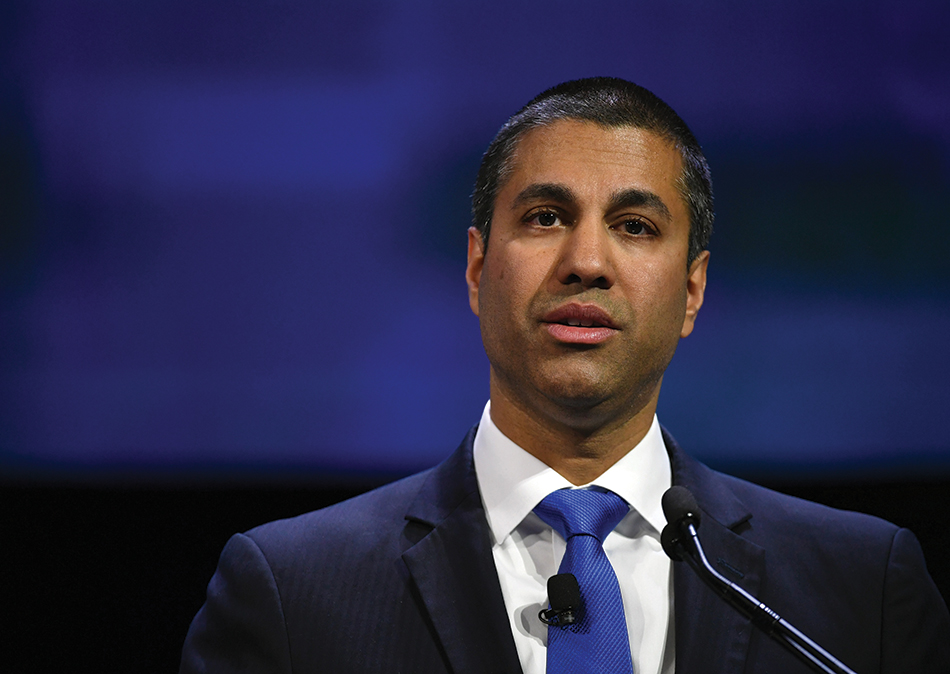Pandemic Spurs Deregulatory D.C.
The smarter way to stay on top of the multichannel video marketplace. Sign up below.
You are now subscribed
Your newsletter sign-up was successful
Federal Communications Commission chairman Ajit Pai’s monthly drip drip drip of process deregulation has become a flood, at least temporarily, as rules for how broadband subsidy money is spent, how spectrum can be used and who can use it are being modified and waived right and left.

The avowed goal is to keep America connected at a time when broadband is a literal lifeline for a homebound populace. That flood is a pedal to the metal version of the chairman’s aim of clearing out the regulatory “underbrush.” But loosening the rules on how money is spent — many meant to keep tabs on that outflow to prevent waste, fraud and abuse — is not part of the usual game plan for a conservative Republican chairman.
The deregulation is temporary, though how temporary depends on the course of the virus. But each day brings new word of a waived restriction or perhaps a special temporary authority to allow Comcast and Dish Network to lend spectrum to T-Mobile, for example.
Then there is the money flowing for telehealth and distance learning, with restrictions lifted that were put in place to combat the potential of waste, fraud and abuse Pai has long targeted.
Talking about regulating in the age of COVID-19 last Friday, Pai said, “In many ways, we’re still building the plane while flying it.”
Like An Alternate Universe
Democrats supportive of this temporary deregulatory flood sounds like the script from an alternate-universe limited (hopefully) series. But so do many scenarios in the current COVID-19 pandemic.
The smarter way to stay on top of the multichannel video marketplace. Sign up below.
Bipartisanship over emergency measures does not extend to the longstanding divides over issues like rural broadband, infrastructure spending, funding for closing the “homework gap” and net neutrality, though.
As FCC Democrat Geoffrey Starks put it, in what at a different time would seem hyperbole, “Our longstanding digital divide has morphed into a monstrous new COVID-19 divide.”
Some see leveraging the crisis to try and secure long-held positions and actions as a sort of public-interest opportunism. But it is undeniable that access to broadband, particularly in rural areas already isolated by geographical distance, has taken on a new urgency. It was also not lost on net neutrality activists that the handful of issues a court had with the FCC’s deregulation of ISPs was that the agency had not sufficiently gauged the impact on public safety and the Lifeline program that subsidizes broadband to low income households. (The FCC says it did.)
Obviously, public-safety communications and making sure low-income people still have broadband connections are big issues these days, particularly when there are millions of people suddenly out of work.
The Benton Foundation, which advocates for expanding the Lifeline program, is calling on the FCC to automatically enroll those 10 million jobless in Lifeline’s broadband subsidy, and to boost subsidies from $9.95 per month to $50.
Companies are also taking advantage of delays. Advertisers and agencies have cited the pandemic in calling for California to delay enforcement of the state’s new privacy law, something in the works long before the virus exploded. The same goes for cable operators and the deadline for new truth-in-billing regulations. They told the FCC the rules should be pushed back to let them focus on the new COVID-19 normal, and the regulator agreed, extending the deadline to January 2021.
Definitely Not Business As Usual
Media Bureau chief Michelle Carey’s explanation of the extension summed up the FCC’s approach to the new business as usual:
“As the nation tackles the COVID-19 pandemic, multichannel video programming distributors (MVPDs) and providers of fixed broadband Internet access service are among the entities that are integral to the Commission’s ongoing, nationwide effort to keep Americans informed and connected during this national emergency,” Carey said in granting the extra time. “So that these service providers may focus their resources on this critical effort, we provide appropriate flexibility for MVPDs and providers of fixed broadband Internet access service to fulfill their obligations under the Television Viewer Protection Act of 2019 (TVPA).”
Senior FCC officials told Multichannel News that while the agency isn’t going to issue blanket extensions, there will be case-by-case flexibility. The FCC also is clearly looking at requests through the lens of an unprecedented national health crisis and of letting broadband operators focus on the business at hand.
Then there are the tech companies, which have pushed back on Trump tariffs for years. They say now is the time to lift what amount to taxes paid by U.S. consumers on modems, network technology, cable and much more. Tech association ITI, in seeking the relief, cited its members’ “crucial role in facilitating a comprehensive U.S. response to the COVID-19 crisis, from manufacturing critical healthcarerelated devices and components, to supporting social distancing policies while providing products and services for telework, remote learning and telehealth arrangements.”
But Trump has signaled the China tariffs aren’t going away anytime soon, pointing to them in one of his COVID-19 briefings when asked what the U.S. response should be to China’s alleged downplaying of the impact of the virus there.
Contributing editor John Eggerton has been an editor and/or writer on media regulation, legislation and policy for over four decades, including covering the FCC, FTC, Congress, the major media trade associations, and the federal courts. In addition to Multichannel News and Broadcasting + Cable, his work has appeared in Radio World, TV Technology, TV Fax, This Week in Consumer Electronics, Variety and the Encyclopedia Britannica.

